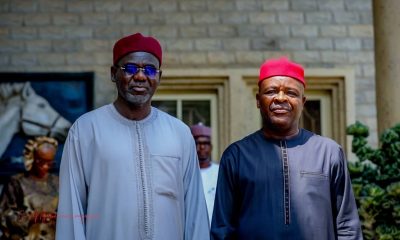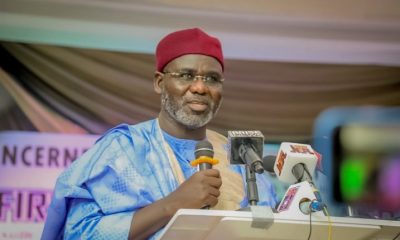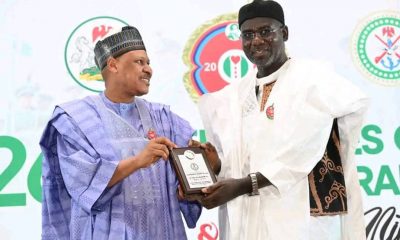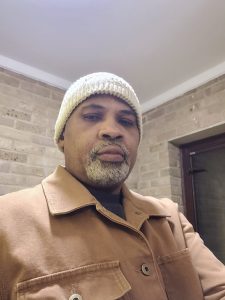SECURITY
Caging Insecurity: Situating Gen. Buratai’s New Recipe

Caging Insecurity: Situating Gen. Buratai’s New Recipe
By Olorunfemi Adejuyigbe
As guest lecturer at a recent symposium on National Security, organised by Arewa House in Kaduna, former Chief of Army Staff and current Ambassador to the Benin Republic, Lt. General Tukur Yusuf Buratai, pitched for negotiation as a resolution option with armed non-state actors. Louis Achi examines the new recipe
For three tough years, Rome had besieged the City of Carthage which was the only existential threat to the Roman Empire thereabouts 142 BC, until the coming of the Vandals several centuries later.
As the battle-hardened Roman General Scipio Africanus who took the city finally in 146 BC watched it burn in complete destruction, he suddenly broke down and wept. It was a shocking spectacle for his troops to behold. Crying for a defeated enemy or pitching for some benign accommodation was an indulgence unknown in that era.
Scipio’s emotional reaction to this particular conclusion of a historic, bloody campaign stemmed from a deep philosophical apprehension that all cities, nations, and authorities must, like men, meet their doom.
In a fundamental sense, General Scipio’s tough exploits and later philosophical sentiments about the enemy echo that of Nigeria’s former Chief of Army Staff (COAS) and current Ambassador to the Benin Republic, Lt. General Tukur Yusuf Buratai. By boldly proposing an alternative engagement modus with non-state actors who have actively sought and are still seeking to bring the nation to her knees and fracture her sovereignty, General Buratai presents a compelling case deserving specific interrogation.
It could be recalled that following his appointment in July 2015 as COAS by President Muhammadu Buhari until he exited in 2021, Lt. Gen. Buratai had besieged the Boko Haram terrorist group and other potent armed non-state actors who posed considerable existential threat to the nation. He led from the front, amidst grueling, multifarious challenges and left with head held high.
Lt. Gen. Buratai had on June 11, 2022, called for dialogue between governments and armed groups, saying a growing practice of engaging in dialogue with all parties to a conflict had emerged since the mid-1980s. He observed that there must be concerted efforts that there are no ungoverned spaces in the land.
He urged state and local governments to establish their presence in their areas of responsibility. According to him, negotiation and dialogue are integrated approaches that can end insecurity by involving traditional and religious leaders, media, security and intelligence agencies.
The former Army boss spoke as a guest lecturer at a one-day symposium on National Security, organised by the Ahmadu Bello University (ABU) Centre for Historical Research and Documentation, Arewa House Kaduna, with the theme ‘Politics and Insecurity in Nigeria: Way Forward’.
Significantly, he further noted that he aligned with the approach being promoted by a revered Islamic cleric, Sheikh Gumi, seen by many as controversial. His words: “This is where I commend Sheikh Gumi for his initiative. One-third of the fight is military; others should be non-kinetic, through dialogue. We must get this solution and this is the right time to get it done.”
Buratai further suggested the revitalisation of the Defense Industries Corporation of Nigeria, better welfare and equipment for police, as well as the establishment of a national border force as done in other parts of the world.
According to him, the issue of the carrot and stick approach can be used to explore ways to end some of the conflicts confronting Nigeria, counselling the Office of the National Security Adviser (ONSA) to collaborate and employ all means to block off supplies to terrorists.
He also held that “the ongoing reforms of the Nigerian Police, procurement of modern platforms for intelligence gathering, and effective control of Nigeria’s porous borders will go a long way” in curbing various forms of insecurity in different parts of the country such as insurgency in the North East, banditry and kidnapping in the North West, agitations in South East and crude oil bunkering in South-South.”
The one day event was graced by heads of military and paramilitary organisations, the Sultan of Sokoto, Muhammadu Sa’ad Abubakar who was represented, university dons, religious leaders, serving and retired military office and prominent Nigerians from diverse walks of life.
Is it conceivable that General Buratai’s diplomatic tour of duty may have mellowed the tough soldier’s appetite for frontal confrontation, or on the other hand, tweaked his philosophy of engagement? Big question!
According to Italian-American Professor of International Relations, Angelo M. Codevilla, “By their very nature, diplomacy and military force are means to the ends of statecraft as well as channels by which governments press their agendas on others. Neither is inherently more or less useful than the other.
“Far from being antithetical to one another, diplomacy and military force are complementary insofar as they serve the same political ends. “What are we after? What are they after?” These questions are as central to warfare as to diplomacy.”
In dissecting General Buratai’s new recipe of caging bloody insecurity, it needs to be stated that current armed conflict in Nigeria is characterised by an abundance of non-state armed groups who compete with the state for control over people, resources, and territory. The composition, areas of influence, and alliances of these groups tend to be fluid and subject to rapid change. This essentially captures the strategy of Boko Haram insurgents.
Beyond this, the internal dynamics within them are often opaque, providing limited opportunities for outsiders to develop an understanding of their interests and to identify opportunities for negotiation. Humanitarian actors, diplomats, and mediators must nevertheless engage these groups if they are to succeed in reducing levels of violence, bring an end to the conflict, or provide humanitarian assistance to vulnerable communities.
Before these negotiations can begin, however, opportunities have to be found or created to bring armed groups to the negotiating table – whether literal or figurative. But then these groups need to be first incentivized.
The most effective incentive for armed groups to negotiate usually relates instead to legitimacy. But careful analysis is needed to ensure these groups enter negotiations in good faith rather than being content to simply appear to negotiate. Opportunities are likely to be scarce for engaging armed groups that derive their legitimacy by violating international norms. Armed groups may also be compelled to negotiate over their desire for humanitarian assistance to substitute for their own responsibilities.
Positive inducements, then, are usually a more effective means of getting armed groups to the negotiating table. The most effective incentive for armed groups usually relates to their need for legitimacy. Many armed groups serve as de facto governments often overseeing a range of government-like services, such as health or education departments. Others have even established putataive sub-national governance structures and often aspire to hold post-conflict leadership positions.
In a significant sense ‘conference diplomacy,’ a term coined by the defunct League of Nations, can contribute to conflict prevention by providing a forum for negotiation over the terms of a conflict’s conclusion, as well as laying the ground for the development of sustainable peace.
As part of the diplomatic toolbox, it allows focused attention to the issue at hand, brings together all relevant actors – ideally in a neutral setting and by a trusted convener – and fosters both momentum as well as a clear deadline for action.
At press time, it cannot be disputed that the nation badly needs an end to the current bloodletting, brazen banditry and kidnapping daily going on. Today, food insecurity, direct fallout from the rampaging banditry, is glaringly real. Is Gen. Buratai the man who saw tomorrow?
Could the tough Roman General Scipio Africanus’ fleetingly gripping insight into the core of the human condition have influenced his Nigerian counterpart, General Buratai, eons later, to reconsider the traditional kinetic engagement with enemies. Has General Buratai, peering into the twilight zone of his eventful life, morphed into a statesman or become a soldier-statesman? Time will tell.
SECURITY
COMPTROLLER KOLA OLADEJI: THE TRAILBLAZING CUSTOMS CHIEF WHO TRANSFORMED BORDER SECURITY AND REVENUE GENERATION AT FOU ZONE A
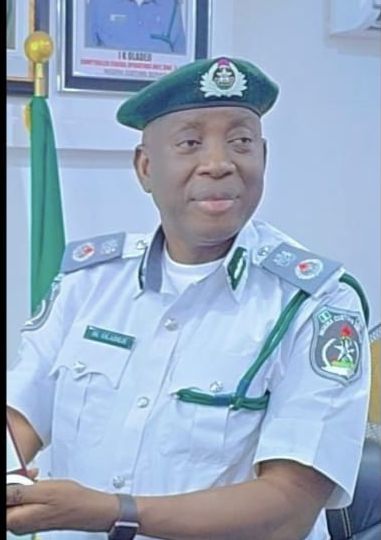
COMPTROLLER KOLA OLADEJI: THE TRAILBLAZING CUSTOMS CHIEF WHO TRANSFORMED BORDER SECURITY AND REVENUE GENERATION AT FOU ZONE A
Sahara Weekly Unveils That In the often chaotic landscape of Nigeria’s border security and revenue collection, one individual has emerged as a transformative leader: Comptroller Kola Oladeji, the immediate past Comptroller of the Federal Operations Unit (FOU) Zone A. Over the course of his 12-month tenure, Oladeji has not only revolutionized Customs operations within that region but has also set a new standard for effective, compassionate, and intelligent border protection in 21st-century Africa. His strategic interventions and leadership approach have created a model that may pose a significant challenge for his successor to fill the substantial gaps left by his redeployment.
Comptroller Oladeji attributes his remarkable achievements to the unwavering support and guidance he received from the current Comptroller General of Customs, CGC Bashir Adewale Adeniyi, as well as the collaboration from all members of the Management of the Service. This backing not only facilitated smoother operations but also empowered him to fulfill his mandate with remarkable efficiency. Under his leadership, the FOU Zone A experienced enhanced operational effectiveness, improved revenue collection, and strengthened border security measures, paving the way for a more organized and secure customs process that benefits both the government and the citizens.
The data available presents a compelling narrative of success; however, it is important to note that as of Wednesday, April 23, there was a noticeable absence of FOU Zone A operatives on the roads of Lagos. Despite this lack of visible presence, the FOU ‘A’, led by the former Comptroller Oladeji, continued to fulfill its primary mission effectively. In recent operations, the unit conducted significant seizures, including a cache of arms and ammunition in Oshodi, Lagos, all based on reliable intelligence. Remarkably, these operations were carried out without seeking media attention, underscoring the commitment of the team to their duties and the delicate nature of their work. Such efforts highlight the ongoing commitment to maintaining security and public safety, even amidst challenges in visibility and outreach.
The impressive performance he has displayed is a direct extension of the outstanding work he accomplished while serving as the Coordinator of the Joint Border Patrol Team for the North West Zone – Sector 2. During his tenure in this role, he not only demonstrated strong leadership and strategic planning but also fostered collaboration among various agencies to enhance border security. His successful initiatives and commitment to excellence in this position ultimately paved the way for his transition to the Federal Operations Unit (FOU) Zone A, where he continues to build on his accomplishments and drive positive results.
When Oladeji took the helm at the Federal Operations Unit (FOU) Zone A, few could have anticipated the remarkable turnaround that would follow. Under his leadership, Zone A exceeded its 2024 revenue target by an astonishing 57.6%, transforming it into Nigeria’s premier revenue-generating unit within the Customs Service. Faced with the challenge of operating without direct control over any major ports, Oladeji and his dedicated team set an ambitious approved revenue target of ₦569 million. Through strategic initiatives, heightened enforcement, and intensified anti-smuggling operations, they achieved a staggering revenue collection of ₦896 million. This achievement not only underscores Oladeji’s exceptional leadership skills but also reflects his ability to innovate and maximize resources in a challenging environment.
But Oladeji’s impact wasn’t just about the figures. It was about a total overhaul, changing the way things were done, shattering off mediocrity. The days of violent clashes with smugglers are behind us. In their place is “Operation Swift Sting” – a smart, intelligence-driven strategy that blends the latest surveillance tech with good old-fashioned detective work. The outcomes have been nothing short of amazing: ₦18 billion worth of contraband seized, including 10,000 donkey skins valued at ₦8 billion that were just moments away from being illegally exported.
One of the most telling seizures was the interception of 11,870 cutlasses, which sent shockwaves through criminal networks in the Southwest. This wasn’t just a Customs operation; it was a proactive move to prevent potential violence. Other seizures read like a list of threats to national security: 50,000 bags of foreign rice that could harm local farmers, 191,000 liters of diverted PMS, 7,861kg of cannabis, and 37,630 doses of Tramadol – each interception a significant step against the forces undermining Nigeria’s stability.
What set Oladeji’s approach apart wasn’t just what he seized, but how he did it. His philosophy was refreshingly straightforward: “We don’t chase smugglers – we outsmart them.” This mindset led to a revenue surge in July 2024, reaching ₦133 million, a 245% increase from the previous year, achieved not through brute force but through careful document checks and demand notices. It proved that brains are far more effective than brawn in customs operations.
The House of Representatives Committee on Customs witnessed this transformation firsthand during their oversight visit. Committee Chairman Leke Abejide didn’t hold back: “What we’ve seen here redefines Customs excellence.” In an organization often linked with controversy, Oladeji built something truly remarkable – a high-performance operation that resists corruption while balancing strict enforcement with community engagement.
As Nigeria faces an economic crossroads, the Oladeji model offers more than just success stories; it provides a roadmap. A roadmap for how technology can outsmart smuggling networks. A roadmap showing that revenue generation and humane enforcement can go hand in hand. And, most importantly, a roadmap highlighting how visionary leadership can turn even the toughest government institutions around.
With the Fourth Mainland Bridge and Lekki Deep Sea Port set to open soon, Oladeji’s strategic position allows him to achieve even greater results. If he’s accomplished this much in just 15 months, imagine the possibilities if his innovative approach were applied nationwide. In a time that craves transformative leadership, Kola Oladeji has not only raised the bar for customs operations – he’s demonstrated what’s achievable when skill, creativity, and courage come together in Nigeria’s public service.
The takeaway is clear: Nigeria’s fight for economic security doesn’t need more weapons – it needs more leaders like Oladeji. Leaders who recognize that true security comes not from guns, but from the smart use of law, technology, and, above all, principled leadership. A remarkable feat of Comptroller Oladeji ‘s tenure was the huge quantum of seizures recorded without firing a single shot at any Nigerian, nor recording a Protest of Nigerians. As his reforms gain national attention, one truth stands out: this is what happens when Nigeria’s brightest minds are given the chance to serve.
Business
Elon Musk’s Team Accuses FEMA of Misusing $59 Million to House Illegal Migrants in Luxury Hotels

Elon Musk’s Team Accuses FEMA of Misusing $59 Million to House Illegal Migrants in Luxury Hotels
Elon Musk’s Department of Government Efficiency (DOGE) has made serious allegations against the Federal Emergency Management Agency (FEMA), claiming that the agency misused $59 million to accommodate illegal migrants in luxurious hotels.
The billionaire entrepreneur revealed this in a tweet on Monday morning, stating that the discovery was made last week. According to Musk, the funds were intended for American disaster relief but were instead diverted in violation of national regulations.
He wrote: “The @DOGE team just discovered that FEMA sent $59M LAST WEEK to luxury hotels in New York City to house illegal migrants. Sending this money violated the law and is in gross insubordination to the President’s executive order. That money is meant for American disaster relief and instead is being spent on high-end hotels for illegals! A clawback demand will be made today to recoup those funds.”
The revelation has sparked controversy, with critics arguing that FEMA’s allocation of funds should prioritize American citizens affected by disasters. The allegations have also intensified scrutiny on FEMA, which has faced previous accusations of financial mismanagement.
An inspector general audit recently revealed that FEMA mishandled nearly $10 billion in COVID-19 relief funds. The audit stated that $8.1 billion in costs remained questionable, while $1.5 billion was allocated prematurely and could have been better utilized for other emergencies.
As scrutiny mounts, former President Donald Trump has reportedly considered abolishing FEMA, describing the agency as “a disaster.” To address these concerns, Trump has established a council, led by Homeland Security Secretary Kristi Noem and Defense Secretary Pete Hegseth, to review FEMA’s operations and propose necessary reforms by late June.
The allegations against FEMA have triggered a broader debate on the proper allocation of taxpayer funds and the government’s role in disaster management. More updates are expected as the situation develops.
Business
Shepherd freight Cargo services Now in Lagos and Ibadan Nigeria

Shepherd freight Cargo services Now in Lagos and Ibadan Nigeria.
-

 celebrity radar - gossips6 months ago
celebrity radar - gossips6 months agoWhy Babangida’s Hilltop Home Became Nigeria’s Political “Mecca”
-

 society6 months ago
society6 months agoPower is a Loan, Not a Possession: The Sacred Duty of Planting People
-

 society5 months ago
society5 months agoReligion: Africa’s Oldest Weapon of Enslavement and the Forgotten Truth
-

 news6 months ago
news6 months agoTHE APPOINTMENT OF WASIU AYINDE BY THE FEDERAL GOVERNMENT AS AN AMBASSADOR SOUNDS EMBARRASSING



